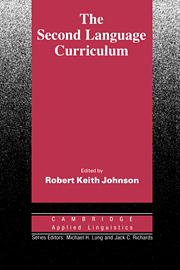Book contents
- Frontmatter
- Contents
- Contributors
- Series editors' preface
- Acknowledgements
- Overview
- I 1 CURRICULUM OVERVIEW
- I 2 CURRICULUM PLANNING
- II ENDS/MEANS SPECIFICATION
- III PROGRAMME IMPLEMENTATION
- IV CLASSROOM IMPLEMENTATION
- V EVALUATION
- Chapter 14 Language program evaluation: a synthesis of existing possibilities
- Chapter 15 The development and use of criterion-referenced tests of language ability in language program evaluation
- Chapter 16 Mastery decisions in program evaluation
- Chapter 17 Tailoring the evaluation to fit the context
- Bibliography
- Index
Chapter 16 - Mastery decisions in program evaluation
Published online by Cambridge University Press: 05 October 2012
- Frontmatter
- Contents
- Contributors
- Series editors' preface
- Acknowledgements
- Overview
- I 1 CURRICULUM OVERVIEW
- I 2 CURRICULUM PLANNING
- II ENDS/MEANS SPECIFICATION
- III PROGRAMME IMPLEMENTATION
- IV CLASSROOM IMPLEMENTATION
- V EVALUATION
- Chapter 14 Language program evaluation: a synthesis of existing possibilities
- Chapter 15 The development and use of criterion-referenced tests of language ability in language program evaluation
- Chapter 16 Mastery decisions in program evaluation
- Chapter 17 Tailoring the evaluation to fit the context
- Bibliography
- Index
Summary
While program evaluation may be conducted on a number of levels including administration, teaching and curriculum, this paper focuses more narrowly on the measurement of student performance as the key in evaluation. It addresses the evaluation issue of student mastery or non-mastery of language program objectives. In doing so, it attempts to view in context issues pertaining to i) the nature of evidence to be used for such student evaluation, ii) the need for evaluation to be accountable to program goals, and iii) the appropriate measurement approach to be taken in mastery evaluation. Mastery decision measurement here refers to the attempt to determine whether an examinee has mastered the content he or she has been taught, or has reached a level of competence defined as mastery. It is by no means a new concept. In fact, a normal part of a teacher's job is making decisions concerning student advancement based on performance. The present discussion will focus on the bases for such decisions and the uses of those decisions in program evaluation.
Throughout the discussions which follow, the context of evaluation should always be kept in mind because evaluation always has consequences. Generally, people do not like to be judged, and they tend not to like their products to be judged. While evaluations may be objective, they are never neutral. Further, evaluations will always have audiences, and the original audience seldom remains the sole audience. Peer evaluations made for a teacher trainer have a way of coming to the attention of the program director.
- Type
- Chapter
- Information
- The Second Language Curriculum , pp. 259 - 269Publisher: Cambridge University PressPrint publication year: 1989
- 5
- Cited by

